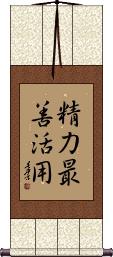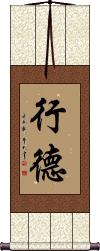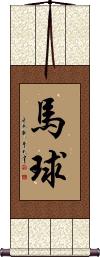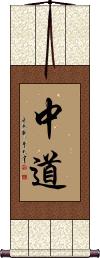Many custom options...
And formats...

Engage in Chinese / Japanese...
Buy an Engage calligraphy wall scroll here!
Personalize your custom “Engage” project by clicking the button next to your favorite “Engage” title below...
Engage with Confidence
理直氣壯 is a Chinese proverb that means “to do something while knowing you’re in the right.”
This can also be translated as and is appropriate when you are:
“In the right and self-confident”
“Bold and confident with justice on one's side”
“Having the courage of one's convictions”
“Justified and forceful”
“To be confident and vigorous because reason and logic are on one's side”
“Justified and confident”
Seiryoku Saizen Katsuyo
Morality of Deed
The idea of “morality of deed” goes along with 行德 or “wu de” (martial morality or virtues of the warrior).
Here, the first character is a representation of the actions or deeds that you engage in.
The second character refers to morality or virtue.
This translates better in English in the opposite order, as the Chinese order is literally “deed morality.”
See Also: Morality of Mind | Martial Morality
Polo
馬球 is the Chinese title for the ancient game of polo.
During the Tang Dynasty (618-907 AD), the elite and rich would mount their horses and engage in this rigorous sport. It was the only sport of that period that women were also known to play.
The original polo came from Persia and may have been played in China hundreds of years before the Tang popularized it.
The characters “馬球” literally mean “horse ball.”
The Middle Way
In the most basic translation, 中道 means road through the middle or middle road.
The expanded meaning can be moderation or the golden mean.
But if you are looking for this title, you are probably seeking the Buddhist definition, which is more complex.
中道 is the middle way or middle path of Buddhism. This has various interpretations. In general, it denotes the mean between two extremes and has special reference to the mean between realism and nihilism, or eternal substantial existence and annihilation.
The Buddha teaches that one should not take things to extremes. Don't be extremely evil and engage in debauchery and murder. But do not spend every waking out trying to be a perfect saint. Instead, take the middle path, try to help others, show loving kindness wherever you can, and try not to do harm. If you inadvertently harm another being, make amends if you can, and move on. Realize you are not perfect, but in time, a path of moderation lead toward proper living and enlightenment.
Not the results for engage that you were looking for?
Below are some entries from our dictionary that may match your engage search...
| Characters If shown, 2nd row is Simp. Chinese |
Pronunciation Romanization |
Simple Dictionary Definition |
業 业 see styles |
yè ye4 yeh hajime はじめ |
More info & calligraphy: Karmadeed; act; work; performance; (personal name) Hajime karman, karma, "action, work, deed"; "moral duty"; "product, result, effect." M.W. The doctrine of the act; deeds and their effects on the character, especially in their relation to succeeding forms of transmigration. The 三業 are thought, word, and deed, each as good, bad, or indifferent. Karma from former lives is 宿業, from present conduct 現業. Karma is moral action that causes future retribution, and either good or evil transmigration. It is also that moral kernel in which each being survives death for further rebirth or metempsychosis. There are categories of 2, 3, 4, 6, and 10; the 六業 are rebirth in the hells, or as animals, hungry ghosts, men, devas, or asuras: v. 六趣. |
作 see styles |
zuò zuo4 tso masaya まさや |
to do; to engage in; to write; to compose; to pretend; to feign; to regard as; to consider to be; to be; to act the part of; to feel (itchy, nauseous etc); writings; works (n,n-suf) (1) work (e.g. of art); piece; production; (2) harvest; crop; yield; cultivation; tillage; (3) technique; (personal name) Masaya To make, do, act, be; arise. |
做 see styles |
zuò zuo4 tso tooru とおる |
to make; to produce; to write; to compose; to do; to engage in; to hold (a party etc); (of a person) to be (an intermediary, a good student etc); to become (husband and wife, friends etc); (of a thing) to serve as; to be used for; to assume (an air or manner) (given name) Tooru |
就 see styles |
jiù jiu4 chiu shuu / shu しゅう |
(after a suppositional clause) in that case; then; (after a clause of action) as soon as; immediately after; (same as 就是[jiu4 shi4]) merely; nothing else but; simply; just; precisely; exactly; only; as little as; as much as; as many as; to approach; to move towards; to undertake; to engage in; (often followed by 著|着[zhe5]) taking advantage of; (of food) to go with; with regard to; concerning; (pattern: 就[jiu4] ... 也[ye3] ...) even if ... still ...; (pattern: 不[bu4] ... 就[jiu4] ...) if not ... then must be ... (surname) Shuu then, thereupon |
從 从 see styles |
cóng cong2 ts`ung tsung jū |
from; through; via; (bound form) to follow; (bound form) to obey; (bound form) to engage in (an activity); (used before a negative) ever; (bound form) (Taiwan pr. [zong4]) retainer; attendant; (bound form) (Taiwan pr. [zong4]) assistant; auxiliary; subordinate; (bound form) (Taiwan pr. [zong4]) related by common paternal grandfather or earlier ancestor To follow, agree with, obey; from; followers, secondary. |
誓 see styles |
shì shi4 shih chikashi ちかし |
oath; vow; to swear; to pledge (personal name) Chikashi To swear, vow, engage to, enter into a contract. |
請 请 see styles |
qǐng qing3 ch`ing ching michi みち |
to ask; to invite; please (do something); to treat (to a meal etc); to request (1) (archaism) request; invitation; (2) (archaism) privilege in criminal law given to nobles of the fifth rank or above (ritsuryō system); (given name) Michi Request, ask, invite; please; engage; acknowledge, announce. |
交火 see styles |
jiāo huǒ jiao1 huo3 chiao huo |
to exchange fire; to engage in a firefight; (fig.) to clash verbally; to exchange sharp criticism |
作弊 see styles |
zuò bì zuo4 bi4 tso pi |
to practice fraud; to cheat; to engage in corrupt practices |
入世 see styles |
rù shì ru4 shi4 ju shih |
to engage with secular society; to involve oneself in human affairs; to join the WTO (abbr. for 加入世界貿易組織|加入世界贸易组织[jia1 ru4 Shi4 jie4 Mao4 yi4 Zu3 zhi1]) |
勸進 劝进 see styles |
quàn jìn quan4 jin4 ch`üan chin chüan chin kanjin |
to cause to engage in |
參戰 参战 see styles |
cān zhàn can1 zhan4 ts`an chan tsan chan |
to go to war; to engage in war |
反特 see styles |
fǎn tè fan3 te4 fan t`e fan te |
to thwart enemy espionage; to engage in counterespionage |
吃瓜 see styles |
chī guā chi1 gua1 ch`ih kua chih kua |
(neologism c. 2016) (slang) to watch an entertaining spectacle from the sidelines and-or engage in gossip about it |
咬む see styles |
kamu かむ |
(transitive verb) (1) to bite; to chew; to gnaw; (2) to crash against (e.g. of waves); to break onto (shore); (3) to engage (of cogs, zippers, etc.); to mesh; to fit together; (4) to be involved in; (5) to fumble one's words (during a play, broadcast, etc.); to falter with one's words; (6) (archaism) to strongly confute; to argue down; to rebuke; to scold harshly |
商談 商谈 see styles |
shāng tán shang1 tan2 shang t`an shang tan shoudan / shodan しょうだん |
to confer; to discuss; to engage in talks (noun/participle) business discussion; negotiation |
嚙合 啮合 see styles |
niè hé nie4 he2 nieh ho |
(of opposing teeth, or gears) to mesh; to engage |
嚼む see styles |
kamu かむ |
(transitive verb) (1) to bite; to chew; to gnaw; (2) to crash against (e.g. of waves); to break onto (shore); (3) to engage (of cogs, zippers, etc.); to mesh; to fit together; (4) to be involved in; (5) to fumble one's words (during a play, broadcast, etc.); to falter with one's words; (6) (archaism) to strongly confute; to argue down; to rebuke; to scold harshly |
延聘 see styles |
yán pìn yan2 pin4 yen p`in yen pin |
to hire; to employ; to engage |
從事 从事 see styles |
cóng shì cong2 shi4 ts`ung shih tsung shih jūji |
to go for; to engage in; to undertake; to deal with; to handle; to do to associate with |
徧參 徧参 see styles |
biàn cān bian4 can1 pien ts`an pien tsan henzan |
travel around to various teachers to engage with them on questions of enlightenment |
應酬 应酬 see styles |
yìng chou ying4 chou5 ying ch`ou ying chou |
to engage in social activities; to socialize; dinner party; banquet; social engagement |
戰鬥 战斗 see styles |
zhàn dòu zhan4 dou4 chan tou |
to fight; to engage in combat; struggle; battle; CL:場|场[chang2],次[ci4] |
打鬧 打闹 see styles |
dǎ nào da3 nao4 ta nao |
to quarrel; to squabble; to be rowdy; to play boisterously; to engage in horseplay |
拼鬥 拼斗 see styles |
pīn dòu pin1 dou4 p`in tou pin tou |
to engage (in a fight) |
掛擋 挂挡 see styles |
guà dǎng gua4 dang3 kua tang |
to put into gear; to engage the gear; gear change |
接戰 接战 see styles |
jiē zhàn jie1 zhan4 chieh chan |
to engage in battle |
搏殺 搏杀 see styles |
bó shā bo2 sha1 po sha |
to fight and kill; to engage in fierce combat (also used figuratively of opposing chess players) |
搞基 see styles |
gǎo jī gao3 ji1 kao chi |
(slang) to engage in male homosexual practices |
文愛 文爱 see styles |
wén ài wen2 ai4 wen ai moe もえ |
(slang) to engage in mutual sexual arousal through written messages (e.g. text, chat); text-based cybersex (female given name) Moe |
Click here for more engage results from our dictionary
The following table may be helpful for those studying Chinese or Japanese...
| Title | Characters | Romaji (Romanized Japanese) | Various forms of Romanized Chinese | |
| Engage with Confidence | 理直氣壯 理直气壮 | lǐ zhí qì zhuàng li3 zhi2 qi4 zhuang4 li zhi qi zhuang lizhiqizhuang | li chih ch`i chuang lichihchichuang li chih chi chuang |
|
| Seiryoku Saizen Katsuyo | 精力最善活用 | Seiryoku saizen katsuyou Seiryokusaizenkatsuyou Seiryoku saizen katsuyo | ||
| Morality of Deed | 行德 | xíng dé / xing2 de2 / xing de / xingde | hsing te / hsingte | |
| Polo | 馬球 马球 | mǎ qiú / ma3 qiu2 / ma qiu / maqiu | ma ch`iu / machiu / ma chiu | |
| The Middle Way | 中道 | chuu dou / chuudou / chu do | zhōng dào zhong1 dao4 zhong dao zhongdao | chung tao chungtao |
| In some entries above you will see that characters have different versions above and below a line. In these cases, the characters above the line are Traditional Chinese, while the ones below are Simplified Chinese. | ||||
Successful Chinese Character and Japanese Kanji calligraphy searches within the last few hours...








